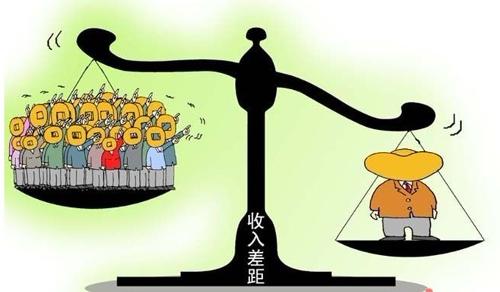Media Report

- Quartz comments: "Economic inequality is rising in emerging economies across the world, with one very big exception. According to recently research (pdf) by economists from Cornell University and Peking University, income inequality in China is falling. The researchers conclude that, after rising dramatically in the 1990s and 2000s due to rapid growth and urbanization, Chinese income inequality reached an inflection point around 2010. Since then, there has been a small but steady reduction in inequality...To construct their series of inequality, the researchers had to combine different data sets based on nationally representative surveys, all of which were collected with some involvement from China's National Bureau of Statistics. Even if Chinese income inequality is falling, it remains high relative to other big countries—only Brazil has a higher Gini coefficient among the world's 10 largest economies. The differences in living standards between coastal and inland residents in China remains stark. For the country's rapid economic growth to become more inclusive, the apparent start of a trend towards falling inequality will need to continue for many decades to come."
- The New York Times reports: "Chinese firms have become significant investors in American start-ups working on cutting-edge technologies with potential military applications. The start-ups include companies that make rocket engines for spacecraft, sensors for autonomous navy ships, and printers that make flexible screens that could be used in fighter-plane cockpits. Many of the Chinese firms are owned by state-owned companies or have connections to Chinese leaders. The deals are ringing alarm bells in Washington. According to a new white paper commissioned by the Department of Defense, Beijing is encouraging Chinese companies with close government ties to invest in American start-ups specializing in critical technologies like artificial intelligence and robots to advance China's military capacity as well as its economy. The white paper, which was distributed to the senior levels of the Trump administration this week, concludes that United States government controls that are supposed to protect potentially critical technologies are falling short, according to three people knowledgeable about its contents, who spoke on the condition of anonymity."
- The Washington Post reports: "When 11 embassies signed on to a joint letter criticizing China over "credible claims" that lawyers and human rights activists have been tortured while in detention, there were two notable abstentions. One was the 28-nation European Union, although some E.U. members signed on to the letter. The other was the United States. Several joint letters have been sent by diplomatic missions in Beijing in the past year or so expressing concern over a crackdown on human rights, with a variety of nations signing on to all or some of the letters. But this marked the first time that the United States declined to sign on the dotted line. When Canada's Globe and Mail broke the story this week, questions were soon raised. Was this a sign that the U.S. government was backtracking on its commitment to human rights under President Trump and Secretary of State Rex Tillerson? No, said the embassy. Tillerson, it pointed out, stood alongside China's foreign minister, Wang Yi, in Beijing on Saturday and said he had made clear in private discussions with his counterpart 'that the United States will continue to advocate for universal values such as human rights and religious freedom.' "
Calendar
- 2017-03-21 China steps up battle against property bubble
- 2017-03-20 In China debut, Tillerson appears to hand Beijing a diplomatic victory
- 2017-03-19 Rex Tillerson, Xi Jinping Meet In China As Secretary Of State Wraps Asia Tour
- 2017-03-17 What Should China and the US Do About North Korea?
- 2017-03-16 5 Questions Tillerson Will Have to Answer in Asia
- 2017-03-15 China to Trump: We don’t want a trade war — but if there is one, you’d lose
- 2017-03-14 Donald Trump, China’s Xi Jinping Planning to Meet Soon
- 2017-03-13 Fake China data: was it just one province?
- 2017-03-12 Schwarzman Sees Donald Trump Dialing Back Criticisms of China
- 2017-03-10 Park’s Ouster Raises Prospect of Reset With China, Kim Jong Un
News
- The New York Times China Bets on Sensitive U.S. Start-Ups, Worrying the Pentagon
- Bloomberg Frozen Beef Stranded at Sea as China Shuts Out Brazil's Meat
- The Associated Press China says no monitoring station on disputed island
- Al Jazeera Philippines to China: Stop Scarborough Shoal plan
- Reuters Myanmar praises China for suspending rebels' bank account
- The New York Times Airbnb's Rivals in China Hold Hands in a Nervous New Market
- The Wall Street Journal Chinese Conglomerate Buys Park Avenue Building for $2.21 Billion
- The Financial Times Australia rejects China push on Silk Road strategy
- The Wall Street Journal Chinese Fury Clouds Soccer Showdown With South Korea
- The Guardian China are the England of Asian football: big hopes followed by inevitable failure
- The Financial Times Waning global appetite for coal-fired power raises climate hopes
- Bloomberg Iron Ore Takes a Battering as Bear Market Engulfs China Futures
- Reuters Struggling in China, Amway bets on technology for turnaround
Commentary
- The Washington Post: Opinions Eleven countries signed a letter slamming China for torturing lawyers. The U.S. did not.
- Quartz China's extreme income inequality finally appears to be falling
- The New Yorker Rex Tillerson's Deferential Visit to China
- The National Interest Why China Must Confront North Korea
- Bloomberg Viwes Look Past Oil to China for Clues to Commodities
- Forbes These High-Profile U.S. Exports To China Growing Too Fast For Trade War, As Trump And Xi Near Meeting
- Foreign Policy What Just Happened in Beijing?
